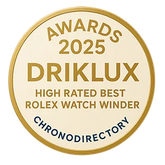The Most Comprehensive Guide to SEIKO Watch TPD and Winding Direction
SEIKO watches are renowned for their Japanese craftsmanship, innovation, and reliability. Understanding the TPD (Turns Per Day) and winding direction is crucial for maintaining these automatic timepieces. Here's a comprehensive guide for various SEIKO models:
| Series | Model | TPD | Direction |
|---|---|---|---|
| Prospex | All Automatic Models | 650-800 | Bidirectional |
| Presage | Automatic Models | 650-800 | Bidirectional |
| Grand Seiko | Automatic Models | 600-800 | Bidirectional |
| 5 Sports | All Models | 650-800 | Bidirectional |
| Astron | GPS Solar Models | N/A | N/A |
Most modern SEIKO automatic watches have a standard TPD range of 650-800 and use bidirectional winding. This is due to SEIKO's use of their in-house movements, which are known for their reliability and efficiency.
When using a watch winder for your SEIKO, it's generally recommended to start with 650 TPD and adjust up to 800 TPD if needed, always with bidirectional rotation to maintain optimal performance. The bidirectional setting allows the watch to wind in both clockwise and counterclockwise directions, mimicking the natural movement of the wrist.
Experimenting with TPD Settings
If you're unsure about the specific TPD setting for your SEIKO watch or want to fine-tune its performance, you can experiment with different settings. Here's a step-by-step guide to help you find the optimal TPD for your SEIKO:
- Start by manually winding your watch. Turn the crown 20 to 30 times to ensure it's fully wound.
- Place your watch in the winder and set it to the lowest TPD setting (650 for most SEIKO watches) with bidirectional rotation.
- Run the winder for 48 hours, periodically checking if the watch is keeping accurate time.
- If the watch is still keeping accurate time after two days, you've found the right setting.
- If the watch is losing time, increase the TPD setting slightly (e.g., to 750) and repeat the 48-hour test.
- Continue adjusting and testing until you find the lowest TPD setting that keeps your watch running accurately, not exceeding 800 TPD.
Remember that SEIKO watches typically have a power reserve of about 40-70 hours, depending on the movement used. If your watch is still running accurately after 48 hours on the winder, it indicates that the winder is providing sufficient turns to keep the mainspring wound.
Additional Considerations
While experimenting with TPD settings can help you find the optimal winding for your SEIKO, keep these points in mind:
- Over-winding is generally not a concern with modern SEIKO watches, as they have built-in mechanisms to prevent damage from excessive winding.
- If you wear your watch regularly, you may not need to keep it on a winder constantly. Winders are most useful for watches that aren't worn daily.
- The natural movement of your wrist while wearing the watch is still the best method for keeping it wound and running accurately.
- SEIKO uses various movements in their watches, including the 4R, 6R, and 8L series. While the general TPD range is similar, there might be slight variations based on the specific movement in your watch.
- Some SEIKO models, especially those in the Grand Seiko line, may have more specific winding requirements. Always refer to your watch's manual for precise instructions.
- SEIKO's Spring Drive and Kinetic movements have different power generation systems and don't require traditional winding.
For more detailed information on watch winder settings and recommendations, you can refer to our comprehensive guide: Watch Winder Settings Guide: Recommended Turns Per Day (TPD).
Remember, while using a watch winder can be convenient, it's also beneficial to wear your SEIKO regularly. The natural movement of your wrist provides the best winding for your timepiece and allows you to enjoy its Japanese craftsmanship and innovative technology fully.
Always consult your watch's specific manual or contact SEIKO customer service for the best care instructions for your particular model, especially if you have a limited edition or a watch with special features.
HOW OUR CUSTOMERS ARE TREATED:
Loyal customers not only come back, they don't just recommend you, they insist that their friends buy from you.. Profit in business comes from repeat customers; customers that boast about your product and outstanding service
















